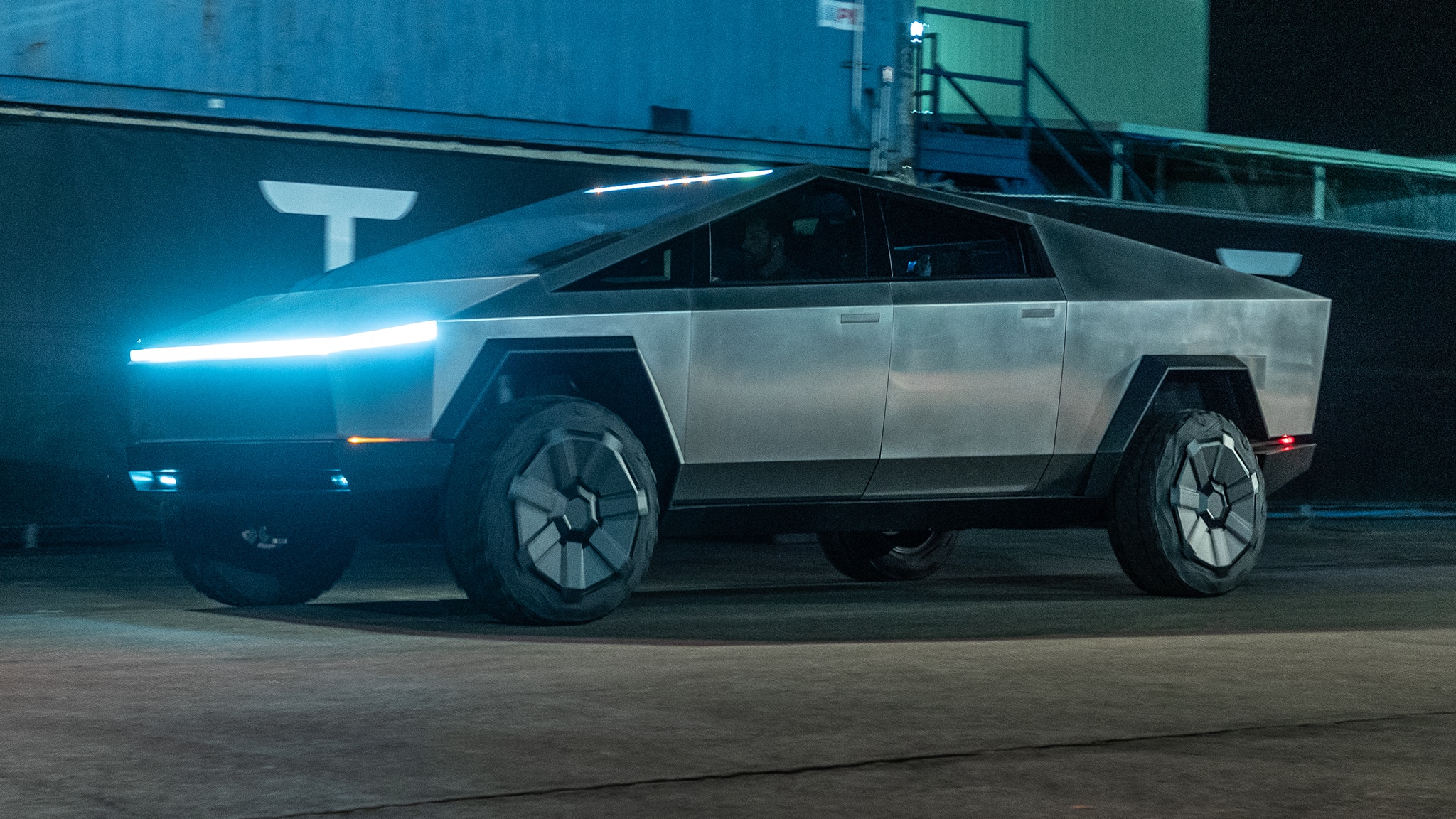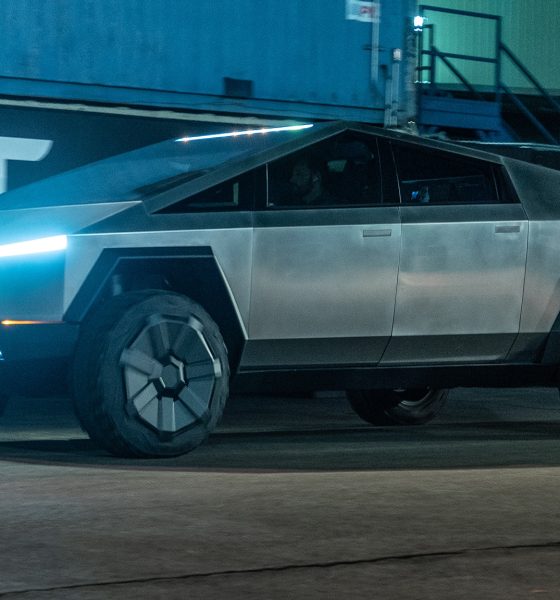

News
Tesla’s CARB letter hints at Cybertrucks’ ‘medium-duty’ class, same segment as Ford F-250
Tesla recently informed California regulators that its upcoming Cybertruck will likely qualify as a Class 2B-3 medium-duty vehicle, hinting that the vehicle will have a gross vehicle weight rating (GVWR), similar to that of the Ford F-250. Tesla’s senior managing policy advisor Sarah Van Cleve detailed the company’s position in a letter dated Dec. 9 to the California Air Resources Board (CARB).
“While we have not yet begun production of the Cybertruck, we expect it to have a towing capacity of 7,500-14,000+ lbs., and it should very likely qualify as a ‘Class 2B-3 medium-duty vehicle,” the policy advisor wrote.
Class 2B pickup trucks are those with a gross vehicle weight rating (GVWR) of 8,501 lbs. to 10,000 lbs. This segment includes Ford’s F-250, the Chevrolet Silverado 2500, and the Ram 2500. Considering that all variants of the Cybertruck have a payload capacity of 3,500, the three versions of the vehicle will likely weigh somewhere around 5,000 to 6,500 lbs.
In the same letter to CARB, Tesla also pushed for the strengthening of the Advanced Clean Truck rules in the state. The company also recommended stricter sales requirements for Class 2B-3 pickup truck manufacturers so California can meet both state and federal clean air requirements.
“Tesla appreciates CARB’s continued leadership in developing innovative clean air policies like the Advanced Clean Truck rule. However, we urge CARB to set more ambitious zero-emission vehicle sales percentages right from the start of the regulation given the urgency of California’s emissions reductions requirements and the fact that the truck industry can move more quickly,” Tesla wrote.
Recently, there was another viral video where YouTubers put a Ford F-150 Raptor against a Tesla Model X P100D in a tug-of-war match. With access to instant torque, the Model X was able to move the Ford F-150 but naysayers point to the difference between the off-road tires on the Raptor and the Model X’s tires, which are perfectly suited for pavement.
It is yet to be seen if there will be a rematch between the Cybertruck and a Ford truck but the Tesla all-electric pickup truck will likely prove to be a towing monster that can instantly use mass amounts of torque, unlike traditional trucks like the F-150. Tesla CEO Elon Musk mentioned this on a previous tweet to stress this point. “Electric motors also have insane torque. If we load both trucks to the max, electric still wins. Physics is the law, everything else is a recommendation,” Musk wrote.
Likewise, a cost of ownership analysis put on spotlight the benefits of owning a Tesla Cybertruck compared to owning a Ford F-150 or any gas-powered pickup for that matter. In California, the upcoming electric pickup truck from Tesla is expected to have a total cost of ownership of $53,379 over five years while the popular Ford truck will cost $72,459. That’s a difference of $19,080 spread over a five-year ownership period.
Read Tesla’s letter to California regulators below.
Tesla Cybertruck Letter by Simon Alvarez on Scribd

News
Tesla ships out an update for everyone that California caused
“This change only updates the name of certain features and text in your vehicle,” the company wrote in Release Notes for the update, “and does not change the way your features behave.”

Tesla has shipped out an update for its vehicles that was caused specifically by a California lawsuit that threatened the company’s ability to sell cars because of how it named its driver assistance suite.
Tesla shipped out Software Update 2026.2.9 starting last week; we received it already, and it only brings a few minor changes, mostly related to how things are referenced.
“This change only updates the name of certain features and text in your vehicle,” the company wrote in Release Notes for the update, “and does not change the way your features behave.”
The following changes came to Tesla vehicles in the update:
- Navigate on Autopilot has now been renamed to Navigate on Autosteer
- FSD Computer has been renamed to AI Computer
Tesla faced a 30-day sales suspension in California after the state’s Department of Motor Vehicles stated the company had to come into compliance regarding the marketing of its automated driving features.
The agency confirmed on February 18 that it had taken a “corrective action” to resolve the issue. That corrective action was renaming certain parts of its ADAS.
Tesla discontinued its standalone Autopilot offering in January and ramped up the marketing of Full Self-Driving Supervised. Tesla had said on X that the issue with naming “was a ‘consumer protection’ order about the use of the term ‘Autopilot’ in a case where not one single customer came forward to say there’s a problem.”
This was a “consumer protection” order about the use of the term “Autopilot” in a case where not one single customer came forward to say there’s a problem.
Sales in California will continue uninterrupted.
— Tesla North America (@tesla_na) December 17, 2025
It is now compliant with the wishes of the California DMV, and we’re all dealing with it now.
This was the first primary dispute over the terminology of Full Self-Driving, but it has undergone some scrutiny at the federal level, as some government officials have claimed the suite has “deceptive” names. Previous Transportation Secretary Pete Buttigieg was one of those federal-level employees who had an issue with the names “Autopilot” and “Full Self-Driving.”
Tesla sued the California DMV over the ruling last week.
News
Tesla workers push back against Giga Berlin unionization
“IG Metall did not succeed in Giga Berlin‘s works council election earlier today. The union share was reduced from nearly 40% in 2024 to 31% in 2026! This is a clear message by the Giga Berlin team towards an independent co-determination! The list called Giga United, led by the current chairwoman, Michaela Schmitz, received the most votes with more than 40%! Good news for Giga Berlin!”

Tesla workers pushed back against unionization efforts at Gigafactory Berlin, and over the past few years, there has been a dramatic decrease in interest to unionize at the German plant.
Gigafactory Berlin Plant Manager André Thierig announced on Wednesday that IG Metall, the European union group, saw its share reduce from 40 to 31 percent in 2026 as employees eligible to vote on the issue. Instead, the Giga Berlin team, known as Giga United, received the most votes with more than 40 percent.
BREAKING! 🚨
IG Metall did not succeed in Giga Berlin‘s works council election earlier today. The union share was reduced from nearly 40% in 2024 to 31% in 2026!
This is a clear message by theGiga Berlin team towards an independent co-determination!
The list called Giga…
— André Thierig (@AndrThie) March 4, 2026
Thierig gave specific details in a post on X:
“IG Metall did not succeed in Giga Berlin‘s works council election earlier today. The union share was reduced from nearly 40% in 2024 to 31% in 2026! This is a clear message by the Giga Berlin team towards an independent co-determination! The list called Giga United, led by the current chairwoman, Michaela Schmitz, received the most votes with more than 40%! Good news for Giga Berlin!”
There were over 10,700 total employees who were eligible to vote, with 87 percent of them turning out to cast what they wanted. There were three key outcomes: Giga United, IG Metall, and other notable groups, with the most popular being the Polish Initiative.
The 37-seat council remains dominated by non-unionized representatives, preserving Giga Berlin as Germany’s only major auto plant without a collective bargaining agreement.
Thierig and Tesla framed the outcome as employee support for an “independent, flexible, and unbureaucratic” future, enabling acceleration on projects like potential expansions or new models. IG Metall expressed disappointment, accusing management of intimidation tactics and an “unfair” campaign.
The first election of this nature happened back in 2022. In 2024, IG Metall emerged as the largest single faction with 39.4 percent, but non-union lists coalesced for a majority.
But this year was different. There was some extra tension at Giga Berlin this year, as just two weeks ago, an IG Metall rep was accused by Tesla of secretly recording a council meeting. The group countersued for defamation.
Tesla Giga Berlin plant manager faces defamation probe after IG Metall union complaint
This result from the 2026 vote reinforced Tesla’s model of direct employee-management alignment over traditional German union structures, amid ongoing debates about working conditions. IG Metall views it as a setback but continues advocacy. Tesla sees it as validation of its approach in a competitive EV market.
This outcome may influence future labor dynamics at Giga Berlin, including any revival of expansion plans or product lines, which Musk has talked about recently.
News
SpaceX President Gwynne Shotwell details xAI power pledge at White House event
The commitment was announced during an event with United States President Donald Trump.

SpaceX President Gwynne Shotwell stated that xAI will develop 1.2 gigawatts of power at its Memphis-area AI supercomputer site as part of the White House’s new “Ratepayer Protection Pledge.”
The commitment was announced during an event with United States President Donald Trump.
During the White House event, Shotwell stated that xAI’s AI data center near Memphis would include a major energy installation designed to support the facility’s power needs.
“As you know, xAI builds huge supercomputers and data centers and we build them fast. Currently, we’re building one on the Tennessee-Mississippi state line. As part of today’s commitment, we will take extensive additional steps to continue to reduce the costs of electricity for our neighbors…
“xAI will therefore commit to develop 1.2 GW of power as our supercomputer’s primary power source. That will be for every additional data center as well. We will expand what is already the largest global Megapack power installation in the world,” Shotwell said.
She added that the system would provide significant backup power capacity.
“The installation will provide enough backup power to power the city of Memphis, and more than sufficient energy to power the town of Southaven, Mississippi where the data center resides. We will build new substations and invest in electrical infrastructure to provide stability to the area’s grid.”
Shotwell also noted that xAI will be supporting the area’s water supply as well.
“We haven’t talked about it yet, but this is actually quite important. We will build state-of-the-art water recycling plants that will protect approximately 4.7 billion gallons of water from the Memphis aquifer each year. And we will employ thousands of American workers from around the city of Memphis on both sides of the TN-MS border,” she noted.
The Ratepayer Protection Pledge was introduced as part of the federal government’s effort to address concerns about rising electricity costs tied to large AI data centers, as noted in an Insider report. Under the agreement, companies developing major AI infrastructure projects committed to covering their own power generation needs and avoiding additional costs for local ratepayers.








